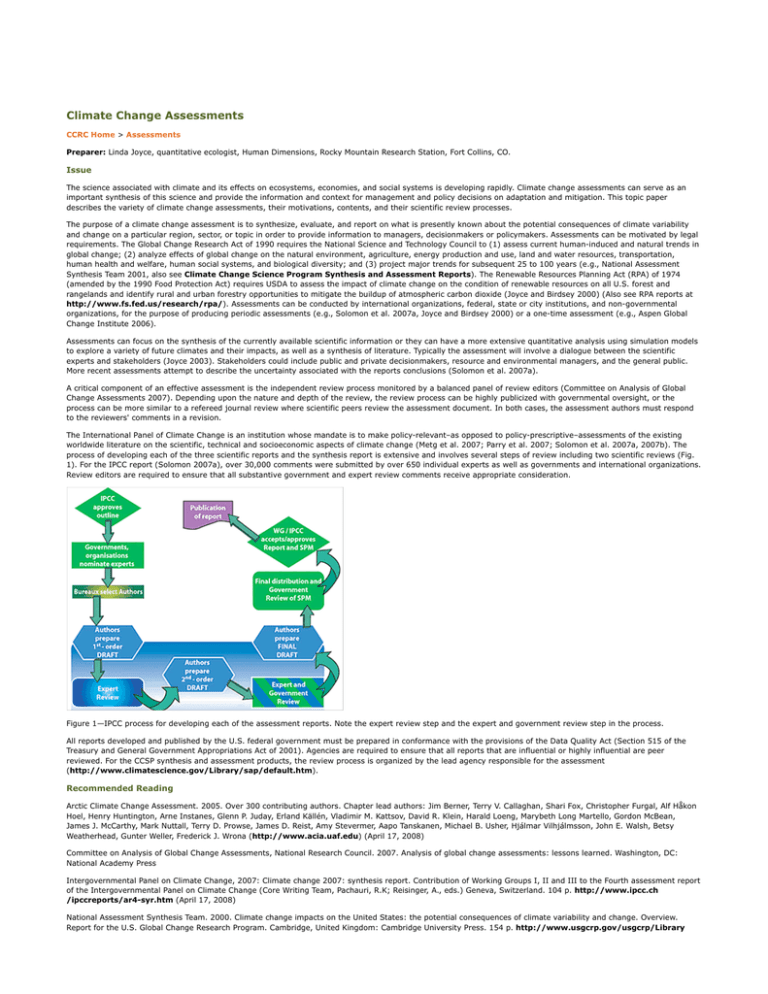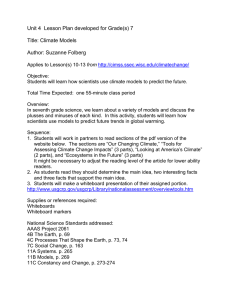Climate Change Assessments Issue
advertisement

Climate Change Assessments CCRC Home > Assessments Preparer: Linda Joyce, quantitative ecologist, Human Dimensions, Rocky Mountain Research Station, Fort Collins, CO. Issue The science associated with climate and its effects on ecosystems, economies, and social systems is developing rapidly. Climate change assessments can serve as an important synthesis of this science and provide the information and context for management and policy decisions on adaptation and mitigation. This topic paper describes the variety of climate change assessments, their motivations, contents, and their scientific review processes. The purpose of a climate change assessment is to synthesize, evaluate, and report on what is presently known about the potential consequences of climate variability and change on a particular region, sector, or topic in order to provide information to managers, decisionmakers or policymakers. Assessments can be motivated by legal requirements. The Global Change Research Act of 1990 requires the National Science and Technology Council to (1) assess current human-induced and natural trends in global change; (2) analyze effects of global change on the natural environment, agriculture, energy production and use, land and water resources, transportation, human health and welfare, human social systems, and biological diversity; and (3) project major trends for subsequent 25 to 100 years (e.g., National Assessment Synthesis Team 2001, also see Climate Change Science Program Synthesis and Assessment Reports). The Renewable Resources Planning Act (RPA) of 1974 (amended by the 1990 Food Protection Act) requires USDA to assess the impact of climate change on the condition of renewable resources on all U.S. forest and rangelands and identify rural and urban forestry opportunities to mitigate the buildup of atmospheric carbon dioxide (Joyce and Birdsey 2000) (Also see RPA reports at http://www.fs.fed.us/research/rpa/). Assessments can be conducted by international organizations, federal, state or city institutions, and non-governmental organizations, for the purpose of producing periodic assessments (e.g., Solomon et al. 2007a, Joyce and Birdsey 2000) or a one-time assessment (e.g., Aspen Global Change Institute 2006). Assessments can focus on the synthesis of the currently available scientific information or they can have a more extensive quantitative analysis using simulation models to explore a variety of future climates and their impacts, as well as a synthesis of literature. Typically the assessment will involve a dialogue between the scientific experts and stakeholders (Joyce 2003). Stakeholders could include public and private decisionmakers, resource and environmental managers, and the general public. More recent assessments attempt to describe the uncertainty associated with the reports conclusions (Solomon et al. 2007a). A critical component of an effective assessment is the independent review process monitored by a balanced panel of review editors (Committee on Analysis of Global Change Assessments 2007). Depending upon the nature and depth of the review, the review process can be highly publicized with governmental oversight, or the process can be more similar to a refereed journal review where scientific peers review the assessment document. In both cases, the assessment authors must respond to the reviewers' comments in a revision. The International Panel of Climate Change is an institution whose mandate is to make policy-relevant–as opposed to policy-prescriptive–assessments of the existing worldwide literature on the scientific, technical and socioeconomic aspects of climate change (Metg et al. 2007; Parry et al. 2007; Solomon et al. 2007a, 2007b). The process of developing each of the three scientific reports and the synthesis report is extensive and involves several steps of review including two scientific reviews (Fig. 1). For the IPCC report (Solomon 2007a), over 30,000 comments were submitted by over 650 individual experts as well as governments and international organizations. Review editors are required to ensure that all substantive government and expert review comments receive appropriate consideration. Figure 1—IPCC process for developing each of the assessment reports. Note the expert review step and the expert and government review step in the process. All reports developed and published by the U.S. federal government must be prepared in conformance with the provisions of the Data Quality Act (Section 515 of the Treasury and General Government Appropriations Act of 2001). Agencies are required to ensure that all reports that are influential or highly influential are peer reviewed. For the CCSP synthesis and assessment products, the review process is organized by the lead agency responsible for the assessment (http://www.climatescience.gov/Library/sap/default.htm). Recommended Reading Arctic Climate Change Assessment. 2005. Over 300 contributing authors. Chapter lead authors: Jim Berner, Terry V. Callaghan, Shari Fox, Christopher Furgal, Alf Håkon Hoel, Henry Huntington, Arne Instanes, Glenn P. Juday, Erland Källén, Vladimir M. Kattsov, David R. Klein, Harald Loeng, Marybeth Long Martello, Gordon McBean, James J. McCarthy, Mark Nuttall, Terry D. Prowse, James D. Reist, Amy Stevermer, Aapo Tanskanen, Michael B. Usher, Hjálmar Vilhjálmsson, John E. Walsh, Betsy Weatherhead, Gunter Weller, Frederick J. Wrona (http://www.acia.uaf.edu) (April 17, 2008) Committee on Analysis of Global Change Assessments, National Research Council. 2007. Analysis of global change assessments: lessons learned. Washington, DC: National Academy Press Intergovernmental Panel on Climate Change, 2007: Climate change 2007: synthesis report. Contribution of Working Groups I, II and III to the Fourth assessment report of the Intergovernmental Panel on Climate Change (Core Writing Team, Pachauri, R.K; Reisinger, A., eds.) Geneva, Switzerland. 104 p. http://www.ipcc.ch /ipccreports/ar4-syr.htm (April 17, 2008) National Assessment Synthesis Team. 2000. Climate change impacts on the United States: the potential consequences of climate variability and change. Overview. Report for the U.S. Global Change Research Program. Cambridge, United Kingdom: Cambridge University Press. 154 p. http://www.usgcrp.gov/usgcrp/Library /nationalassessment/overview.htm (April 17, 2008) National Assessment Synthesis Team. 2001. Climate change impacts on the United States: the potential consequences of climate variability and change. Foundation Report. Report for the U.S. Global Change Research Program. Cambridge, United Kingdom: Cambridge University Press. http://www.usgcrp.gov/usgcrp/Library /nationalassessment/foundation.htm (April 17, 2008) There are various levels of assessments that can provide information at different scales: International: U.S. National Assessments National Assessment Synthesis Team (2001) information for the United States and regions within the United States. Their conclusion is that natural ecosystems appear to be the most vulnerable to the harmful effects of climate change (See http://www.usgcrp.gov/usgcrp/Library/nationalassessment/overview.htm). Regional assessments within the National Assessment include the Great Plains, Rocky Mountains, Pacific Northwest, Alaska, California, and the Southwest (http://www.usgcrp.gov/usgcrp/Library/nationalassessment/overviewregions.htm). Analyses of various sectors in the national assessment report include water resources, forestry, coastal resources, agriculture and human health (http://www.usgcrp.gov/usgcrp/Library/nationalassessment/overviewsectors.htm). The U.S. Climate Change Science Program (http://www.climatescience.gov/) is developing 21 synthesis and assessment reports (http://www.climatescience.gov/Library /sap/sap-summary.php) spanning areas focusing on historical climate and its variability, the role of greenhouse gases in bringing about changes in the Earth’s climate and related systems, quantifying uncertainty in projections of how the Earth’s climate and environmental systems may change in the future, the sensitivity and adaptability of different natural and managed ecosystems and human systems to climate and related global changes, and exploring opportunities and information needed to manage risks and opportunities related to climate variability and change. Several of the reports focus on ecosystems and adaptability: Sensitivity and adaptability of coastal systems to rising sea level on the U.S. coastal zone (New York to North Carolina) (http://www.climatescience.gov/Library /sap/sap4-1/default.php). Ecosystem thresholds of change--synthesizing the present state of scientific understanding regarding potential abrupt state changes or regime shifts in ecosystems in response to climate change (http://www.climatescience.gov/Library/sap/sap4-2/default.php). Effects of climate change on agriculture, land resources, water resources, and biodiversity (http://www.climatescience.gov/Library/sap/sap4-3/default.php). Adaptation options for climate sensitive ecosystems and resources (http://www.climatescience.gov/Library/sap/sap4-4/default.php). Regional Assessments The Regional Integrated Sciences and Assessments Program (RISA) supports research that addresses complex climate-sensitive issues of concern to decisionmakers and policy planners at a regional level. The RISA research team members are primarily based at universities although some of the team members are based at government research facilities, nonprofit organizations, or private sector entities. Traditionally the research has focused on the fisheries, water, wildfire, and agriculture sectors. The program also supports research into climate-sensitive public health issues. Recently, coastal restoration has also become an important research focus for some of the teams (http://www.climate.noaa.gov/cpo_pa/risa/). Barnett, T.; Malone, R.; Pennell, W.; Stammer, D.; Semtner, B.; Washington, W. 2004. The effects of climate change on water resources in the West: introduction and overview. Climatic Change. 62(13): 1-11. Joyce, L.A.; Aber, J.; McNulty, S.; Dale, V.H.; Hansen, A.; Irland, L.C.; Neilson, R.P.; Skog, K. 2001. Potential consequences of climate variability and change for the forests of the United States. In: National Assessment Synthesis Team. Climate change impacts on the United States: the potential consequences of climate variability and change. Report for the U.S. Global Change Research Program. Cambridge UK: Cambridge University Press: 489-522. Chapter 17. State of Arizona. 2007. Arizona Climate Action Initiative. http://www.azclimatechange.gov/background/science.html (May 13, 2008) State of Alaska. 2007. Climate Change Strategy. http://www.climatechange.alaska.gov/ (May 13, 2008) State of California. 2004. Climate Change http://www.climatechange.ca.gov/policies/state_roles.html (May 13, 2008) Colorado Department of Public Health and Environment. 1998. Climate change and Colorado—a technical assessment. http://www.cdphe.state.co.us/ap/down /climatechange.pdf (May 13, 2008) State of Montana. Climate Change Advisory Committee. http://www.mtclimatechange.us/ State of New Mexico. Climate Change Advisory Group. http://www.nmclimatechange.us/ Agency Technical Work Group. State of New Mexico. 2005. Potential Effects of Climate Change on New Mexico. http://www.nmenv.state.nm.us/aqb/cc /Potential_Effects_Climate_Change_NM.pdf State of Oregon. Climate change. http://www.oregon.gov/ENERGY/GBLWRM/CCIG.shtml Resource Innovations. Institute for a Sustainable Environment, University of Oregon. 2005. The economic impacts of climate change in Oregon: a preliminary assessment. 21 p. (http://climlead.uoregon.edu/publicationspress/Consensus_report.pdf) State of Utah. Climate Change Work Group http://www.deq.utah.gov/Issues/Climate_Change/index.htm State of Washington. Climate Change. http://www.ecy.wa.gov/climatechange/index.htm References Cited Aspen Global Change Institute. 2006. Climate change and Aspen: an assessment of potential impacts and responses. http://www.agci.org/pdf/Canary/ACIA_Report.pdf. (April 17, 2008) Joyce, L.A. 2003. Improving the flow of scientific information across the interface of forest science and policy. Forest Policy and Economics. 5: 239-247. Joyce, L.A.; Birdsey, R. tech. eds. 2000. The impact of climate change on America’s forests. Gen. Tech. Rep. RMRS-GTR-59. Fort Collins, CO: U.S. Department of Agriculture, Forest Service, Rocky Mountain Research Station. 133 p. http://www.treesearch.fs.fed.us/pubs/4567 (April 17, 2008) Metz, B.; Davidson, O.R.; Bosch, P.R.; Dave, R.; Meyer, L.A., eds. 2007c. Climate change 2007: Mitigation of Climate Change. Contribution of Working Group III to the Fourth Assessment Report of the Intergovernmental Panel on Climate Change. Cambridge, United Kingdom and New York: Cambridge University Press. 862 p. National Assessment Synthesis Team. 2001. Climate change impacts on the United States: the potential consequences of climate variability and change. Foundation Report. Report for the U.S. Global Change Research Program. Cambridge, United Kingdom: Cambridge University Press. http://www.usgcrp.gov/usgcrp/Library /nationalassessment/foundation.htm. (April 17, 2008) Parry, M.L.; Canziani, O.F.; Palutikof, J.P.; van der Linden, P.J.; Hanson, C.E., eds. 2007b. Climate change 2007: Impacts, Adaptation and Vulnerability. Contribution of Working Group II to the Fourth assessment report of the Intergovernmental Panel on Climate Change. Cambridge, UK: Cambridge University Press. 976 p. Solomon, S.; Qin, D.; Manning, M.; Chen, Z.; Marquis, M.; Avery, K.B.; Tignor M.; Miller, H.L., eds. 2007a. Climate change 2007: The physical science basis. Contribution of Working Group I to the Fourth assessment report of the Intergovernmental Panel on Climate Change. Cambridge, United Kingdom and New York, NY: Cambridge University Press. 996 p. Solomon, S.; Qin, D.; Manning, M.; Chen, Z.; Marquis, M.; Averyt, K.B.; Tignor, M.; Miller, H.L., eds. 2007b. Climate change 2007: the synthesis report. Contribution of Working Group I to the Fourth Assessment Report of the Intergovernmental Panel on Climate Change. Cambridge, United Kingdom and New York: Cambridge University Press. 996 p. U.S. Climate Change Science Program. http://www.climatescience.gov (April 17, 2008) Recommended Citation Joyce, L.A. 2008. Climate Change Assessments. (May 20, 2008). U.S. Department of Agriculture, Forest Service, Climate Change Resource Center. http://www.fs.fed.us/ccrc/topics/assessments.shtml.


